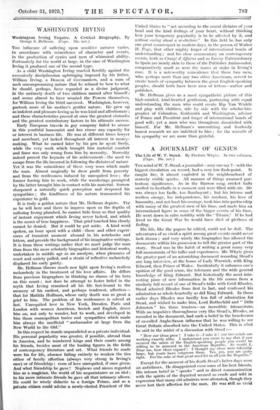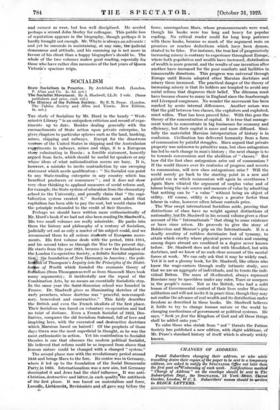A JOURNALIST OF GENIUS
The Life of W. T. Stead. By Frederic Whyte. In two volumes. (Cape. 36s. net.) The Life of W. T. Stead. By Frederic Whyte. In two volumes. (Cape. 36s. net.)
THE mind of W. T. Stead, a journalist—may one say ?—with the biggest circulation on record, had a very low flash-point. It caught fire, it almost exploded in the neighbourhood of scarcely visible sparks. All manner of things assumed por- tentous significance. As in the Harrow song, cricket balls swelled to footballs in a moment and were filled with air. He was always too facile, too flamboyant ; but his intense and restless energy, his independence, his candour, his love of humanity, and not least his courage, took him into partnership with many of the greatest men of his time, and made him an international figure in some of the bigger events of his time. He went down in calm nobility with the ' Titanic.' If he had lived to the Great War he would have died of plethora of feeling.
His life, like the papers he edited, could not be dull. The adventures of so vivid a spirit among great events could never lack drama ; and very wisely the biographer has allowed the documents within his possession to tell the greater part of the story. Stead was in the habit of writing a great many very full memoranda of his talks and experiences. Mr. Whyte gives the greater part of an astonishing document recording Stead's one long interview, at the house of Lady Warwick, with King Edward, then Prince of Wales. Incidentally it enhances one's opinion of the good sense, the tolerance and the wide general knowledge of King Edward. But historically the most inte- resting piece of new information in the life comes from a similarly full record of one of Stead's talks with Cecil Rhodes. Stead admired Rhodes from first to last, and confessed his admiration as whole-heartedly as did King Edward. In those earlier days Rhodes was hardly less full of admiration for Stead, and wished to make him, Lord Rothschild and " little Johnston " his three trustees—an incredible triumvirate. With an impulsive thoroughness very like Stead's, Rhodes, as recorded in the document, had such a belief in the beneficence of so-called Anglo-Saxon influence that he was willing to see Great Britain absorbed into the United States. This is what he said in the midst of a discussion with Stead :-
" How our ideas grow ! I take it—I take it ! our two minds are working exactly alike. I understand you mean to say that if you secured the union of the English-speaking people you would be willing to be annexed to the American Republic. So would I. Dear me, how ideas expand ! I thought my ideas were tolerably large, but yours have outgrown them. Yes, yes, you are quite right. For the sake of that great need let us all join the Republic.
Except for the moment of his death Stead's latter days were an anticlimax. He disappointed even some of his best Mends. His intense belief in " spooks " and in direct communication with the spirits of the departed seemed so crude and wild in expression that many old admirers were alienated, though they never lost their affection for the man. He was still as vivid and earnest as ever, but less well disciplined. He needed perhaps a. second John Morley for colleague. This- public loss of reputation appears in the biography, though perhaps it is hardly brought out enough. Mr. Whyte is always.anadvocate ; and yet he succeeds in maintaining, at any rata, the ,judicial demeanour and attitude, and his summing up is not more in favour of his client than a happy biographer's should be. The whole of the two volumes makes good reading, especially for those who have rather dim memories of the last years of Queen Victoria's spacious reign.































































 Previous page
Previous page